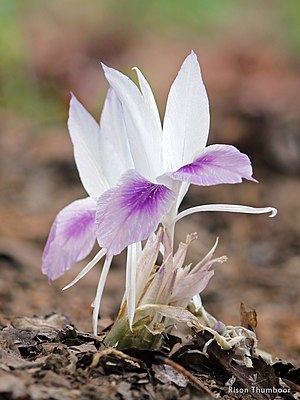Note: This is a project under development. The articles on this wiki are just being initiated and broadly incomplete. You can Help creating new pages.
Difference between revisions of "Kaempferia rotunda"
| Line 77: | Line 77: | ||
==External Links== | ==External Links== | ||
| − | * [ ] | + | * [http://www.flowersofindia.net/catalog/slides/Bhumi%20Champa.html Kaempferia rotunda on flowersofindia.net] |
| − | * [ ] | + | * [https://indiabiodiversity.org/species/show/230160 Kaempferia rotunda on indiabiodiversity.org] |
| − | + | ||
[[Category:Herbs]] | [[Category:Herbs]] | ||
[[Category:Pages without herbs images]] | [[Category:Pages without herbs images]] | ||
Revision as of 13:11, 28 May 2020
Kaempferia rotunda is a perennial, stemless plant producing a pseudostem with 2 - 4 erect leaves from an underground rhizome that has small tuberous roots. Flowering stems are produced from the rhizome when no leaves are present.
Contents
- 1 Uses
- 2 Parts Used
- 3 Chemical Composition
- 4 Common names
- 5 Properties
- 6 Habit
- 7 Identification
- 8 List of Ayurvedic medicine in which the herb is used
- 9 Where to get the saplings
- 10 Mode of Propagation
- 11 How to plant/cultivate
- 12 Commonly seen growing in areas
- 13 Photo Gallery
- 14 References
- 15 External Links
Uses
Sprains, Infarction, Diabetes, Atherosclerosis, Cancer.[1]
Parts Used
Chemical Composition
The plant yields flavonoids, crotepoxide, chalcones, quercetin, flavonols, B-sitosterol, stigmasterol, syringic acid, protocatechuic acid and hydrocarbons.[2]
Common names
| Language | Common name |
|---|---|
| Kannada | Kusunde |
| Hindi | Bhuyichampa |
| Malayalam | Chennalinirkuva |
| Tamil | Konda-kalava |
| Telugu | Kondakaluva |
| Marathi | Bhui-champa |
| Gujarathi | |
| Punjabi | |
| Kashmiri | |
| Sanskrit | Bhuchampaka |
| English | Bhumi Champa |
Properties
Reference: Dravya - Substance, Rasa - Taste, Guna - Qualities, Veerya - Potency, Vipaka - Post-digesion effect, Karma - Pharmacological activity, Prabhava - Therepeutics.
Dravya
Rasa
Guna
Veerya
Vipaka
Karma
Prabhava
Habit
Identification
Leaf
| Kind | Shape | Feature |
|---|---|---|
Flower
| Type | Size | Color and composition | Stamen | More information |
|---|---|---|---|---|
| {{{5}}} |
Fruit
| Type | Size | Mass | Appearance | Seeds | More information |
|---|---|---|---|---|---|
Other features
List of Ayurvedic medicine in which the herb is used
Where to get the saplings
Mode of Propagation
Seeds, Division of the rhizomes.
How to plant/cultivate
Prefers a position in partial shade.[4]
Commonly seen growing in areas
Monsoon forests, Open grassland, [[:Category:Herbs that are commonly seen in the region of |]], [[:Category:Herbs that are commonly seen in the region of |]], [[:Category:Herbs that are commonly seen in the region of |]].
Photo Gallery
References
- ↑ Indian Medicinal Plants by C.P.Khare
- ↑ [Chemistry]
- ↑ [Morphology]
- ↑ Cultivation
External Links
- Ayurvedic Herbs known to be helpful to treat Sprains
- Ayurvedic Herbs known to be helpful to treat Infarction
- Ayurvedic Herbs known to be helpful to treat Diabetes
- Ayurvedic Herbs known to be helpful to treat Atherosclerosis
- Ayurvedic Herbs known to be helpful to treat Cancer
- Herbs with Rhizomes used in medicine
- Herbs with Young leaves used in medicine
- Herbs with common name in Kannada
- Herbs with common name in Hindi
- Herbs with common name in Malayalam
- Herbs with common name in Tamil
- Herbs with common name in Telugu
- Herbs with common name in Marathi
- Herbs with common name in Sanskrit
- Herbs with common name in English
- Habit - Perennial
- Index of Plants which can be propagated by Seeds
- Index of Plants which can be propagated by Division of the rhizomes
- Herbs that are commonly seen in the region of Monsoon forests
- Herbs that are commonly seen in the region of Open grassland
- Herbs that are commonly seen in the region of
- Herbs
- Pages without herbs images




